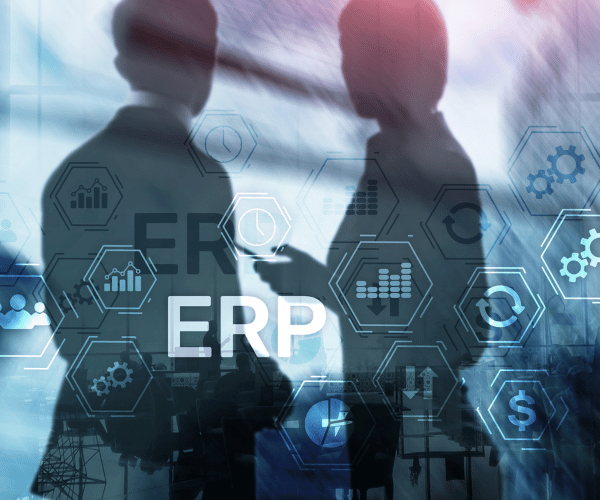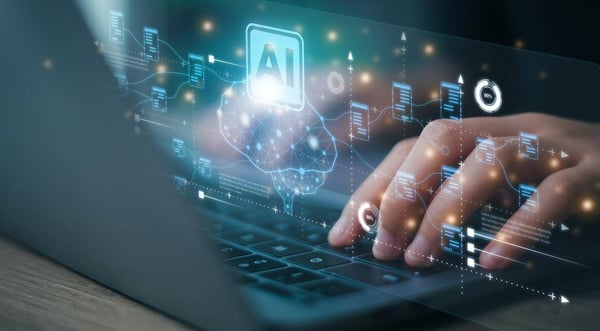What if there was a way for SMBs to harness the power of ERP systems without the burden of complexity and cost?
The answer is Artificial Intelligence (AI). This comprehensive overview will provide you with everything you need to know about AI in ERP systems for SMBs. We’ll explore the benefits of AI for SMBs, examine the challenges of implementation, and guide you through the process of getting started.
ARTIFICIAL INTELLIGENCE AND ERP SYSTEMS: WORKING TOGETHER FOR SMBs
WHAT IS ARTIFICIAL INTELLIGENCE?
Artificial Intelligence (AI) is no longer science fiction. It’s the engineering marvel behind machines that can mimic human cognitive abilities. Imagine software that can learn, reason, and solve problems just like you do. AI encompasses several technologies that enable machines to perform tasks such as:
- Complex decision making
- Automated problem solving
- natural language processing
How is Generative AI different from AI?
Unlike traditional AI, which follows pre-programmed rules, GenAI uses algorithms to generate entirely new ideas and content. It analyzes existing data, such as text, images, or code, and uses that knowledge to create:
- Original content
- Innovative approaches to business challenges or product development
- Realistic data sets to train other AI systems, accelerating their learning and development.
Imagine having a system that can generate fresh marketing ideas, identify hidden patterns in customer data, or even automate the generation of reports with insightful narratives. That’s what GenAI can do for your business.

The intersection of Generative AI and ERP
The integration of Generative AI into ERP systems is revolutionizing the way businesses operate. It not only boosts productivity and efficiency but also positions companies to better respond to market dynamics and customer needs.
The dynamic nature of GenAI, combined with the rich functionality of ERP systems, provides a powerful tool for modern businesses.

THE CHALLENGES OF TRADITIONAL ERP SYSTEMS
COMPLEXITY AND STEEP LEARNING CURVE
ERP systems are often complex, with a wide range of functionality. Mastering these features requires extensive training, which can be time consuming and costly for SMBs with limited resources.
CUSTOMIZATION BOTTLENECKS
Tailoring a traditional ERP system to specific business processes can be challenging. Customizations often require specialized programming skills or costly vendor assistance, limiting flexibility and responsiveness.
INTEGRATION CHALLENGES
Integrating a traditional ERP system with other key business systems, such as CRM or marketing automation platforms, can be difficult and time-consuming. This often results in data silos that disrupt the smooth flow of information and reduce efficiency.
HIGH UPFRONT COSTS
The initial investment for traditional ERP systems can be substantial, including software licenses, hardware infrastructure, and implementation services. These high costs can be prohibitive for SMBs with limited budgets.
SCALABILITY ISSUES
Traditional ERP systems may not scale easily to accommodate business growth. As an SMB expands, the ERP system may struggle to manage increasing data volumes and complexity, hindering growth and adaptability.
LIMITED INNOVATION AND FLEXIBILITY
Traditional ERP systems often follow rigid structures and workflows that stifle innovation and limit the ability to implement new processes or integrate the latest technologies.
WHY SHOULD SMBS CONSIDER INTEGRATING THEIR ERP SYSTEM WITH ARTIFICIAL INTELLIGENCE?
Traditional ERPs can be challenging for SMBs due to their complexity, cost, and scalability limitations.
AI-powered solutions represent a revolutionary leap forward. They address the limitations of traditional systems and usher in a new era of ERP functionality designed specifically to empower SMBs.
How does AI work in ERP systems and how does it transform them?
- Improve efficiency and productivity: AI automates repetitive tasks across departments, streamlining workflows and freeing employees to focus on strategic initiatives. This translates into significant gains in overall operational efficiency and productivity.
- Data-driven decision-making: AI-powered ERP systems use advanced analytics to extract valuable insights from vast amounts of ERP data, including sales figures, inventory levels, and customer interactions. These insights are transformed into actionable reports and dashboards that inform strategic decisions.
- Improve customer service: AI chatbots provide 24/7 customer support, answering frequently asked questions, troubleshooting common issues, and even scheduling appointments or processing returns. This frees up customer service agents to focus their time on more complex inquiries and provide personalized support, increasing customer satisfaction and loyalty.
- Cost-effective: Often delivered as cloud-based solutions, AI-powered ERP systems eliminate the need for upfront investments in hardware infrastructure. This can make them a more cost-effective option for SMBs with limited budgets.
- Scalability for growth: Designed to scale with your business, AI-powered ERP systems can adapt to your evolving needs as data volumes and operational complexity increase.
CHALLENGES OF IMPLEMENTING ARTIFICIAL INTELLIGENCE IN ERP SYSTEMS
While AI-powered ERP systems offer significant benefits, there are also challenges to consider during implementation:
Preparing your business for AI
This includes key considerations such as assessing your current business processes, determining your data readiness, and ensuring your team has the skills necessary to effectively use an AI-powered system.

UNDERSTANDING YOUR BUSINESS NEEDS AND GOALS
A clear understanding of your specific business needs and goals is critical to selecting the right AI-powered ERP solution, and ensuring it aligns with your overall business strategy.

DATA SECURITY AND PRIVACY CONCERNS
The security of sensitive customer data should be a top priority, as increased automation increases exposure to cyber threats and malicious actors who can exploit any vulnerabilities in the system.
.png?width=600&height=500&name=AI%20security%20(600x500%20px).png)
CHANGE MANAGEMENT AND USER ADOPTION
Transitioning to a new ERP system, even one with AI capabilities, requires change management strategies to ensure user adoption and maximize benefits. If employees aren’t properly trained on how to use AI and ML tools within the ERP system, they may not realize their full potential, or worse, misuse them.

THE FUTURE OF WORK: THE IMPACT ON BUSINESS OPERATIONS
The integration of AI into ERP systems will bring significant advancements, transforming business operations in profound ways. Here are the top five trends to watch:
- Advanced predictive analytics: Future AI-powered ERP systems will provide deeper insights by predicting market shifts and operational bottlenecks with greater accuracy.
- Autonomous decision-making: Next-generation ERP systems will manage entire workflows autonomously, freeing up human resources for strategic initiatives and innovation.
- AI-enabled collaboration: AI will streamline communication and project management, increasing productivity and fostering a more collaborative work environment.
- Continuous learning and adaptation: AI systems will continuously learn and adapt from real-time data through machine learning (ML), optimizing business processes and enhancing efficiency over time.
- Integration with emerging technologies: AI-powered ERP systems will increasingly integrate with blockchain, Internet of Thing (IoT), and Augmented Reality (AR), creating sophisticated and interconnected systems for enhanced capabilities.
The future of AI in ERP systems promises to have a transformative impact on business operations. As AI technologies continue to advance, they will enable smarter, more efficient, and more connected ways of working.
FREQUENTLY ASKED QUESTIONS
- How can AI be used in ERP?
AI supercharges ERP systems with automation and data insights. It automates tasks and analyzes data to uncover trends, enabling better forecasting and decision-making. - What is Generative AI for ERP ?
Unlike traditional AI, which follows preset rules, generative AI can analyze your existing ERP data and create entirely new content and solutions. This can be anything from generating custom reports and automating workflows to brainstorming innovative business strategies. - How to use AI in business processes?
The impact of AI goes beyond ERP systems. AI can streamline operations across departments. For example, AI-powered chatbots can handle customer service inquiries, and marketing and sales can use AI for targeted campaigns. - Will AI replace ERP systems?
Think of AI as a powerful extension of your ERP system. It doesn’t replace the core functionalities of ERP but rather adds a layer of intelligence to automate tasks, analyze data, and provide deeper insights to support more informed decisions. - What is the future of ERP systems?
As ERP systems and AI become more deeply integrated, we can expect a powerful platform that not only manages your business data, but also learns from it, adapting to changing conditions and even anticipating your future needs.
AI is revolutionizing ERP systems by unlocking operational efficiency and enabling data-driven decision-making. Automation, advanced data analysis, and faster, more accurate decision-making streamline workflows and drive cost savings.
While careful risk management is crucial, the potential of AI/ML in ERP is undeniable.
Ready to use AI?
MyWave.ai is an advanced agentic generative artificial intelligence platform (GenAI), designed to transform digital processes. The solution operates as an authentic AI collaborator, performing tasks in the name of users via a conversational user interface.
Integrating harmoniously with ERP systems, CRM and marketing tools, MyWave.ai automates workflows and personalizes interactions, allowing your team to make decisions informed by data and optimize interactions with the customers.

READ MORE ON ARTIFICIAL INTELLIGENCE AND ERP SYSTEMS
DO YOU WANT TO KNOW MORE?
Request your personalized demo and find out how our ERP solutions can help support your business growth.



